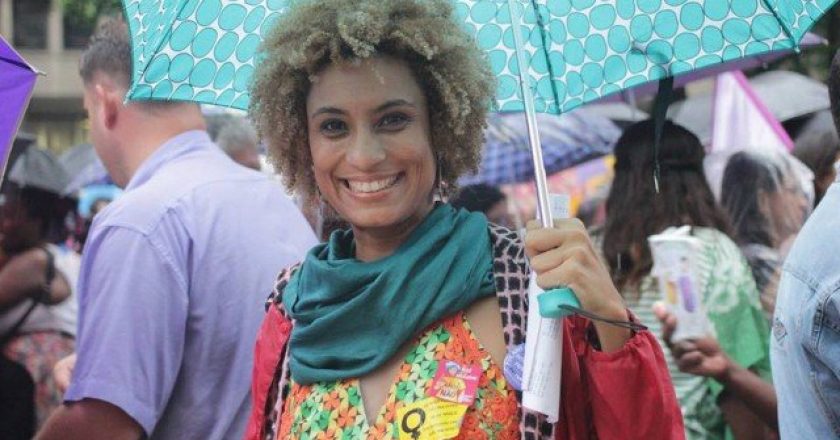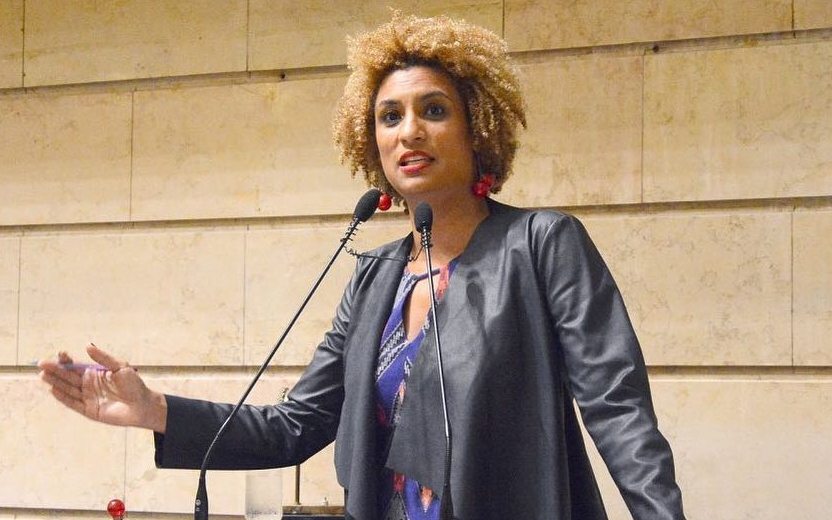Latin America
Related: About this forumRio councilwoman's murder puts army takeover in spotlight
Rio councilwoman's murder puts army takeover in spotlight
Peter Prengaman and Mauricio Savarese, Associated Press
Updated 1:42 pm, Thursday, March 15, 2018
RIO DE JANEIRO (AP) — A popular Rio de Janeiro councilwoman was shot in the head four times by assassins, police said Thursday, a brazen murder that shocked Brazil and raised questions about the effectiveness of a military intervention in the city.
A police official told The Associated Press that 38-year-old Marielle Franco was killed Wednesday night by perpetrators who appeared to know exactly where she would be sitting in a car with tinted windows. The official revealed details on condition of anonymity because he was not authorized to discuss the case publicly.
In the attack in the Rio neighborhood of Estacio de Sa, driver Anderson Pedro Gomes was killed and Franco's press officer, Fernanda Chaves, was injured. It happened after Franco participated in an event focused on empowering young black women.
Elected in 2016, Franco was a member of the left-leaning Socialism and Liberty Party known for her social work in poor and marginalized communities, or favelas, and outspokenness against police violence, which disproportionately impacts black residents.
More:
https://www.chron.com/news/world/article/Rio-councilwoman-s-murder-puts-army-takeover-in-12756278.php
LBN:
https://www.democraticunderground.com/10142014806



Rest in Peace, Marielle Franco.
Judi Lynn
(160,451 posts)By JILL LANGLOIS
MAR 15, 2018 | 3:45 PM
| SÃO PAULO, BRAZIL
Marielle Franco, a hard-charging City Council member, had become the face of resistance in Rio de Janeiro as she defended the city's marginalized communities, stood up for human rights and railed against a police force she believed was overly aggressive.
She was at it again Wednesday, urging supporters at a rally she'd organized to push for better treatment of black women
Hours later, she was dead, gunned down along with her driver as they traveled through the city's downtown.
Franco's death reverberated across the city and beyond as thousands of people gathered at rallies, expressed their outrage on Twitter and wept openly in public. Several human rights organization suggested the shooting was political and was an attack on those who push for improved rights in Brazil. Activists urged authorities to investigate the slaying as an assassination.
More:
http://www.latimes.com/world/la-fg-brazil-marielle-franco-20180315-story.html
Judi Lynn
(160,451 posts)The Life and Death of a Defiant Voice
03/15/2018 - 14H10
Ouvir o texto
JOSÉ ROBERTO DE TOLEDO
The bars across Rio's South Zone were packed with fans watching Flamengo defeat Ecuadorian team Emelec. The Rio football team was surging on social media as well, leading Brazil's trending topics on Twitter on Wednesday night. Amidst thousands of tweets about the players who turned the game around, a name which had nothing to do with the match began climbing the list of trends: Marielle Franco. Slowly, the drama on the field gave way to an emblematic tragedy.
A leader in one of Rio's largest impoverished communities - Maré, a group of 16 favelas cramped between two highways, home to 130,000 people - Franco received the fifth-most votes of the 51 candidates elected to City Council in 2016. She was elected with over 46,000 votes; it was her first time standing for office. She used her tenure to denounce police violence and to defend the interests and concerns of Black women like herself. A representative of the Socialism and Liberty Party, or PSOL, and a sociologist with a master's in public administration, she had just been asked to serve as rapporteur on the City Council commission formed to monitor the military intervention into Rio's security apparatus. She never got the chance to fulfill her mission.
At around 9:30 p.m., as Flamengo took to the field in Ecuador, the white Chevrolet Agile that carried Marielle Franco was overtaken by another vehicle at the corner of Rua Joaquim Palhares and Rua João Paulo I, not far from Rio's downtown. There were at least nine shots. Eight projectiles pierced the rear passenger window, just where Franco was sitting. The ninth went into the bodywork. Four hit the councilor in the head. Marielle Franco died at age 38. She would have turned 39 in July.
The bullets went through the Agile on a diagonal, and three wound up fatally hitting the driver, Anderson Pedro Gomes. Their trajectory suggests that the shooter was behind the Agile on the right. If we imagine a clock face with Franco at the center, her assassin was between four and five o'clock. That is not the position of a person announcing a robbery; it may be that of a person planning an execution. Nothing was stolen. The angle and precision of the shots spared the press officer traveling in the passenger seat, in front of Franco.
More:
http://www1.folha.uol.com.br/internacional/en/brazil/2018/03/1960708-te-life-and-death-of-a-defiant-voice.shtml
Judi Lynn
(160,451 posts)Editorial
The killing of a Rio city councillor has sparked mass protests across the country. But will her warnings be heeded?
Fri 16 Mar 2018 13.16 EDT Last modified on Fri 16 Mar 2018 18.00 EDT
Political cynicism is rife in Brazil, for good reason. Years of scandal have left many regarding elected representatives en masse as corrupt, incompetent liars and democracy as broken. Murder is frequent in Rio de Janeiro. Yet tens of thousands have taken to the streets across the country to protest against the killing of Rio politician Marielle Franco and her driver, in what is widely regarded as an assassination.
Franco, 38, was shot dead on Wednesday, only 18 months after her election to the city council. She was a black single mother from the favelas in a field dominated by privileged white men. Sceptics wondered if she could get elected, yet her tally of votes was the fifth highest of more than 50 councillors. In her short tenure she had become a beacon for progressive politics locally, on issues including LGBT and women’s rights and an outspoken critic of the aggressive, militarised policing of the favelas, where residents live under the brutal control of drug gangs, but are also terrorised by state violence.
Brazil sees a 10th of the world’s homicides. The toll rose to 61,600 in 2016; police killed more than 4,200 people. The victims, in both cases, are disproportionately black. Rightwing President Michel Temer put the army in charge of the city’s security, with one eye on the rise of extreme right former army captain Jair Bolsonaro, who is polling in second place ahead of this year’s presidential elections and has thrived on fomenting fears of disorder. Favela residents have bitterly opposed the move, fearing it will only spur more bloodshed. “How many others will have to die for this war to end?” Franco wrote in one of her last tweets, addressing police violence. She had just been appointed rapporteur for a commission monitoring the militarisation of public security. Police and prosecution sources have indicated that they think it most likely her killing was related to her political work.
The outrage of her murder should only illuminate the power of her message. In some ways her story symbolises the evolution of social movements in Brazil and the way that a longstanding working-class protest movement has begun to form connections with middle-class activism: she was an intellectual born and raised in a favela. Some supporters hope that her death will prove a turning point, saying the strength of the protests suggests it has broken a widespread apathy.
More:
https://www.theguardian.com/commentisfree/2018/mar/16/the-guardian-view-on-the-of-brazilian-politicians-marielle-francos-legacy
Judi Lynn
(160,451 posts)WRITTEN BY
Kiratiana Freelon
6 hours ago
Rio de Janeiro

When Michel Temer became the president of Brazil in May of 2016, replacing the impeached Dilma Rousseff, he nominated a 23-member cabinet of all white men. His bold rejection of diversity shocked women and blacks, who had grown accustomed to at least some minimal representation in national politics. Four months later, Marielle Franco, a black lesbian woman hailing from the Maré favela, received the fifth-most votes in the Rio de Janeiro city council elections. Her dominant win and her subsequent follow through on her promises gave hope to many Brazilians who longed for representation and had grown tired of Brazil’s corrupt and disconnected politicians.
That hope didn’t last long.
On the night of Mar. 14, Franco, 38, was assassinated in her car after leaving a black women’s empowerment event that she had organized. Of the nine shots fired, four hit her head. Her driver, Anderson Pedro also died. The news of her death quickly spread through messaging and social media networks. According to Piauí, over the next 42 hours, Franco became the subject of more than 3.6 million tweets from 400,000 users in 54 countries and in 34 languages—more than the impeachment of president Dilma Rousseff.
By the next morning, there were already vigils, and protests planned in 15 cities across Brazil. More than 20,000 people showed up in Rio de Janeiro’s Cinelandia neighborhood the night she was buried. These protests spread across the world as people in New York City, Paris and even Buenos Aires held gatherings and protests in her honor.
More:
https://qz.com/1231910/brazils-marielle-franco-murder-has-made-her-a-global-human-rights-icon/